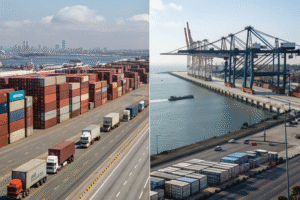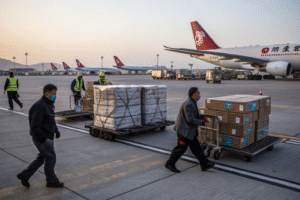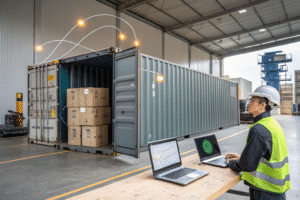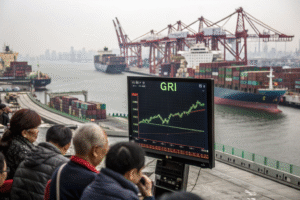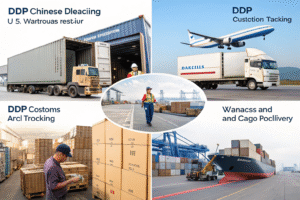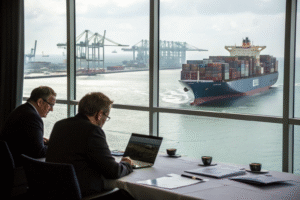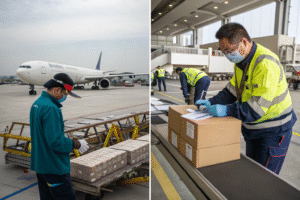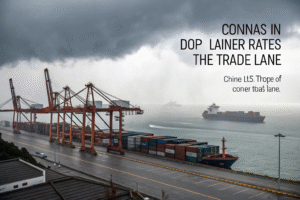If you've ever tried to move goods across borders, you probably felt confused, overwhelmed, or stuck. You're not alone. Many business owners feel the same when facing shipping rules, documents, and port delays.
Freight forwarding is the behind-the-scenes solution that makes global shipping smooth and stress-free. It connects factories to warehouses across oceans, handling logistics so you don’t have to.
Think of a freight forwarder as your logistics translator. When your cargo needs to travel from a Chinese port to a U.S. warehouse, we make that journey easier, safer, and often faster. Let me explain how it works and why it matters to your business.
What does a freight forwarder actually do?
When I started in this industry, I had the same question. What does a freight forwarder really do? Is it just booking space on ships? Or printing documents? The truth is much more than that.
A freight forwarder acts as your full-service shipping coordinator. We plan, manage, and execute the transportation of your cargo across borders — from factory pickup to final delivery.

How do freight forwarders simplify cross-border logistics for you?
We handle the parts of shipping that most people don’t want to touch. That includes customs paperwork, cargo insurance, warehouse coordination, and even solving issues with port delays or strikes. Our team talks to carriers, customs officers, and port workers so you don’t have to.
Here’s a simple breakdown of what a reliable freight forwarder like GeeseCargo usually handles:
| Service | Description |
|---|---|
| Pickup & Export | We collect cargo from your factory and arrange export clearance |
| Carrier Booking | We reserve space on vessels, airplanes, or trains |
| Documentation | We prepare commercial invoices, packing lists, and more |
| Customs Clearance | We manage import/export taxes and approvals |
| Delivery | We coordinate last-mile delivery to the destination warehouse |
| Cargo Insurance | We help you get covered in case of damage or loss |
Most clients like Ron (a U.S. company owner sourcing clothing and gifts from China) don’t want to deal with the hundreds of details in shipping. And they shouldn’t have to. Freight forwarding is about taking all that complexity and making it invisible to the client — while keeping everything under control.
Why can’t factories or suppliers just handle shipping themselves?
Some buyers think their suppliers can manage freight. In many cases, suppliers can arrange basic shipping. But they aren’t logistics experts. They usually don’t offer transparency, don’t track real-time delays, and may not optimize for your best interest.
For example, I’ve seen suppliers book slower or riskier routes just to save a few dollars — without considering how that delay might affect your peak season. As a freight forwarder, we work for you, not the supplier. That’s a big difference.
Step-by-step process of international freight forwarding
International shipping may seem complicated, but once you break it down, it follows a repeatable, proven path. And once we run this process a few times for your shipments, it becomes smooth and predictable.
The international freight forwarding process follows a clear step-by-step path — from factory pickup in China to warehouse delivery in the USA. Each step is handled by specialists to ensure security, speed, and compliance.

What are the exact steps involved from start to finish?
Let me walk you through a typical door-to-door shipment from China to the U.S., which we at GeeseCargo handle all the time for clients like Ron:
| Step | Action |
|---|---|
| 1 | Factory finishes production |
| 2 | We pick up cargo from factory |
| 3 | Export clearance at Chinese customs |
| 4 | Cargo loaded onto container or air freight |
| 5 | Ocean or air transit begins |
| 6 | Arrival at U.S. port or airport |
| 7 | Import customs clearance |
| 8 | Final delivery to client’s warehouse |
Every one of these steps involves paperwork, timing, and communication. For example, if your shipping mark is wrong or your HS code isn’t declared correctly, your cargo might get delayed for weeks. That’s why working with a professional freight forwarder reduces risk.
What problems can occur at each step, and how do we solve them?
Let’s be real — shipping isn’t always smooth. Ports get congested. Customs rules change. Carriers cancel sailings. But a good freight forwarder anticipates and solves these problems.
Here are a few examples:
-
Problem: Cargo ready earlier than planned
Our Solution: We adjust pickup and book faster sailing options -
Problem: Port delay due to holiday backlog
Our Solution: We reroute to a less congested port -
Problem: Import tax classification dispute
Our Solution: We work with customs brokers to clarify and negotiate
In my early days, I once had a shipment get stuck at Long Beach port due to a paperwork mismatch. It cost the client $3,000 in late fees. Since then, we’ve built a checklist system that flags these issues before they happen.
Key benefits of using a freight forwarder for your business
Running a business is hard enough — sourcing, inventory, sales, customer service. Adding international logistics to that list is a recipe for chaos. That’s where we come in.
Freight forwarders give business owners peace of mind, better shipping rates, and smoother supply chains. We let you focus on growth, while we handle the shipping headaches.

What real value does a freight forwarder add?
Here’s a summary of the benefits you get when working with a reliable forwarder like GeeseCargo:
| Benefit | What It Means for You |
|---|---|
| Lower Rates | We negotiate bulk pricing with carriers |
| Faster Transit | We know which routes are fastest and most reliable |
| Problem Solving | We handle customs, delays, rerouting, and more |
| Full Transparency | You get regular updates, documents, and live tracking |
| Fewer Mistakes | We triple-check your documents and cargo labeling |
These benefits directly affect your profit margins. For example, let’s say Ron saves $200 per shipment using our route suggestion. Over 100 shipments a year, that’s $20,000 in savings — not to mention fewer delays and stress.
What if your cargo gets stuck or lost — will a freight forwarder help?
Yes, absolutely. This is one of the most important reasons to work with a freight forwarder. When things go wrong — and they sometimes do — we jump in to fix it. We call the port, talk to customs, reissue documents, and keep you updated.
I remember one case where a client’s high-value electronics shipment got flagged for inspection in the U.S. We worked with the port authority to speed up the process, reducing a potential 12-day delay to just 3 days. That kind of response isn’t possible without a strong forwarder.
Freight forwarding vs. shipping: What’s the difference?
This is a question I hear from many first-time importers. Isn’t freight forwarding just shipping? Not quite. Let’s clear up the confusion.
Shipping is the act of moving goods from point A to B. Freight forwarding is the management of that process — including planning, booking, problem-solving, and customs.

Why is freight forwarding a smarter option than direct shipping?
Here’s the key: when you “just ship,” you’re often dealing with a carrier. Carriers move goods, but they don’t manage you. They won’t help if you get stuck with customs forms. They won’t suggest better routes. And they definitely won’t warn you if a delay is coming.
Freight forwarders, on the other hand, are your advocate. We protect your interests, look out for cost savings, and simplify everything from documentation to delivery.
Here’s a quick comparison:
| Feature | Shipping (Carrier) | Freight Forwarder |
|---|---|---|
| Books cargo space | ✅ | ✅ |
| Plans best route | ❌ | ✅ |
| Handles documents | ❌ | ✅ |
| Solves port issues | ❌ | ✅ |
| Provides door-to-door | ❌ | ✅ |
What happens when you choose the wrong option?
If you go straight to a carrier or supplier and skip a freight forwarder, here’s what might happen:
- Your documents get rejected at customs
- You overpay for shipping because you missed better routes
- You get no updates during delays
- You lose weeks trying to solve logistics problems alone
I’ve seen this happen to small businesses that thought they were saving money. Instead, they lost time, inventory, and customer trust. That’s why having us — a freight forwarder — in your corner is essential.
Conclusion
Freight forwarding isn’t just about moving goods. It’s about protecting your business, your timelines, and your bottom line. With the right partner, international shipping becomes predictable and profitable.

